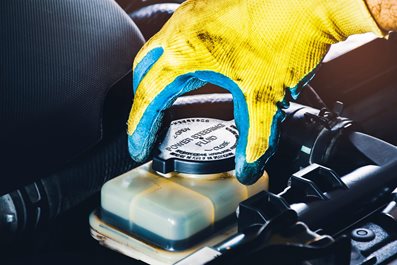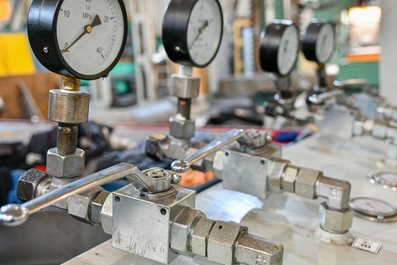Types of Fire-Resistant Hydraulic Fluids

Fire-resistant hydraulic fluids are specially formulated to provide increased fire resistance, in addition to their core role of providing lubrication for hydraulic components. They are designed for use in high-temperature and high-fire-risk environments where the potential for a sudden fire or explosion exists due to friction, sparks, or other ignition sources.
Fire-Resistant Fluid Applications
Fire-resistant hydraulic fluids are commonly used in applications such as industrial machinery, off-highway vehicles and mobile equipment, aircraft, marine vessels, power plants, and other high-risk or hazardous environments. They can also be used to lubricate internal combustion engines, which require a higher level of fire protection than standard motor oils provide due to their increased levels of friction.
Characteristics of Fire-Resistant Fluids
Fire-resistant fluids are essential to safety as they help reduce the chances of fires and explosions caused by internal or external sources when working with potentially volatile materials.
The most important characteristics of fire-resistant fluids are their resistance to thermal degradation, combustibility, and flash point. Fire-resistant fluids should also be non-toxic and have good lubrication properties in order to protect the components they are being used with.
Additionally, they should be compatible with any seals or hoses that may come into contact with them to ensure proper performance over time. Lastly, the fluid must be able to maintain its viscosity levels over extended periods so as not to affect system performance.
Types of Fire-Resistant Hydraulic Fluids
Each type of fluid has distinct properties that make it suitable for particular applications and environmental conditions and include the following hydraulic oils.
Water Glycols
Water glycol fluids typically contain an alcohol such as ethylene glycol or propylene glycol mixed with water and other additives. These fluids have excellent heat transfer capabilities, making them ideal for applications involving large amounts of cooling capacity. However, they can also be corrosive on certain metals, so care must be taken when selecting this fluid type.
Phosphate Esters
Phosphate ester-based hydraulic fluids offer superior thermal stability compared to other options but may be susceptible to oxidation over time, leading to decreased performance levels if not maintained properly. Additionally, phosphate esters may cause staining on some surfaces, so caution should be exercised when using these products near sensitive materials.
Oil-in-Emulsion Fluids
Oil-in-emulsion fluids are typically used in applications where a high degree of fire resistance is required and can be made up of mineral oil, water glycols, or phosphate esters. The fluid’s emulsified nature helps suppress combustion by forming a protective barrier between the liquid and air, which prevents ignition from external sources.
Synthetic Hydrocarbons
Synthetic hydrocarbon-based hydraulics generally offer long life expectancy, as well as good flame-retardant qualities while still being compatible with many standard seals and hoses used in industrial settings. However, they tend to cost more than traditional mineral oils, so they may not always be the most economical option, depending on application requirements.
Polyol Ester Fluids
Polyol ester-based fluids are a relatively new type of fire-resistant hydraulic fluid and offer excellent thermal stability, good lubrication properties, and superior fire resistance compared to traditional mineral oils. However, they can be more expensive, so they may not always be the most cost-effective choice for certain applications.
Inhibited Mineral Oils
Inhibited mineral oil-based hydraulics are often less expensive than synthetic alternatives. However, thanks to their corrosion inhibitor, they still possess good fire-resistant characteristics, which help protect against fires from static electricity sparks and other potential ignition sources. They also remain stable at higher temperatures than many synthetics, which is useful in applications where elevated operating temperatures occur regularly.
Choosing the Best Fire-Resistant Fluid

When selecting the best fire-resistant hydraulic fluid for your needs, it’s important to consider factors such as:
- Hydraulic System Pressure Ratings
- Operating Temperatures
- Compatibility with Existing Pumps, Motors, Seals, Hoses, and Metals
- Relevant Applicable Flammability Regulations
- Cost Efficacy
- Quality Assurance Standards
- Environmental Impacts
Ultimately there is no “one size fits all” solution. Careful consideration must go into choosing a product that will deliver optimum safety while meeting your operational needs. Failure to select the right fire-resistant fluids could result in costly breakdowns or, worse, complete system failures.
For help selecting the best fire-resistant hydraulic oils, as well as hydraulic system parts to keep your system operational, please feel free to contact White House Products, Ltd. at +44 (0) 1475 742500 today.
Back to blog posts